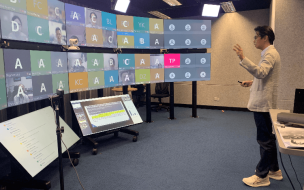Business schools are adapting their MBA syllabus to meet that requirement. Hong Kong University of Science and Technology (HKUST) Business School has introduced its new DiMBA program, a two-year, part-time Digital MBA for Global Leaders. It’s the first MBA in Asia among the Financial Times’ (FT) Global MBA Ranking 2021 top 25 to offer an online learning option for candidates.
As work has moved online, the way we lead and learn has changed. Here are the five virtual leadership skills you'll acquire on an Online MBA.
1. Remote communication
A big challenge for leaders managing remotely is efficiently getting their point across to staff all over the world, and ensuring that everyone is on the same page. Coordinating and communicating with staff is made far more difficult when they are not just a few desks away.
An Online MBA can help prepare students for this, as they will have to remotely coordinate and communicate during group work and assignments.

Professor Tai-Yuan Chen (pictured right), the associate dean and Digital MBA program director at HKUST, believes the DiMBA program—which delivers the same content students would get on campus—will allow students to enhance their remote communication skills.
“DiMBA students will have the same amount of interaction with each other as their face-to-face counterparts during class discussions, case studies, presentations, and team projects, albeit in a virtual format instead of sitting next to each other, which will train them to be effective leaders in the virtual workplace.”
2. Relationship building
Online MBA students come from all over the world, and it is essential for a leader to be able to navigate professional relationships virtually to ensure business bonds go beyond borders. By creating a global network of students, MBA candidates can learn the important ways to build relationships online, and how cultures differ between nations.
“Traditional part-time face-to-face programs only draw students from local areas or nearby cities. The Digital MBA offers a class diversity unmatched in any other part-time MBA program in Asia so students can network with professionals and learn about new opportunities beyond their countries,” explains Chen.
The course also allows students to participate in an overseas study tour and to take on new courses at global partner schools. The Virtual MBA Community is a hub for students and alumni to meet, connect, and network with people based all over the world in a variety of industries.
Face to face events are still available to students, and HKUST sets up local networking activities in a variety of cities to enable professionals studying remotely to network in their home country.
3. Lifelong learning
The market has moved and adapted rapidly since the start of the COVID-19 pandemic and digital skills are now increasingly important. Leaders need to be able to identify when upskilling is necessary and to commit to a culture of lifelong learning to remain abreast of the latest business trends.
HKUST’s DiMBA offers opportunities for alumni to join online classes after graduation, so they can continue to develop their skills and knowledge post-graduation. The program trains students to be adept, self-motivated, and disciplined learners who continue to upgrade their knowledge and skills as business changes with time.
4. Motivation
Motivating a team virtually is trickier than doing it in person, and a lack of motivation may impact innovation and creativity. With the rise of economic and emotional pressures due to increased health and financial risk caused by the pandemic, it is also easy for a workforce to feel overwhelmed and on edge, distracted from the task at hand.
As reported by the Harvard Business Review in 2020, ‘if you want your teams to be engaged in their work, you have to make their work engaging. The most powerful way to do this is to give people the opportunity to experiment and solve problems that really matter.’
An Online MBA can help you solve these specific problems virtually, and to experiment with the nuances of business through group assignments and theoretical development.
Students of the DiMBA program learn to work successfully in remote teams by learning to maneuver cultural differences and to experiment with various methods of motivating colleagues.
As part of the program’s Professional Empowerment Series, students sharpen their ability to deliver motivating virtual presentations, as well as learn how to lead teams virtually.
5. How to use tech to better your business
Business leaders graduating from MBA programs today need to know how business and technology overlap, and how the latter can help inform better business decision making.
The HKUST DiMBA program offers modules on AI, Python, cryptocurrency, FinTech, and business analytics so that students can better harness the power of technology for business and make more informed data-driven decisions. The program has a variety of career tracks so that MBAs come away better-informed about a variety of areas with courses focusing on Business Technology & Analytics, Finance, Consulting, Sustainable Leadership, and Marketing.
The Professional Empowerment program improves students' virtual interview and presentation skills, and there are professional workshops that review their resume, and virtual networking skills. Industry seminars also keep students up to date with the latest cross-industry developments and trends.
Getting to grips with the way technology and business are now interlinked, and the trends the pandemic has accelerated, are both key to leaders succeeding in 2021.
“The pandemic has changed the traditional perception of online learning and increased the demand for digital leadership and transformation skills. The future is digital, and professionals need a digital-focused education to adapt to the new normal," Chen concludes.
Student Reviews
HKUST Business School








